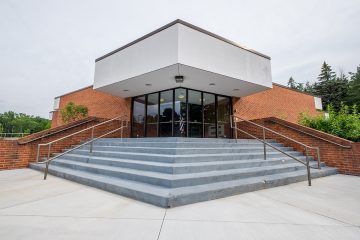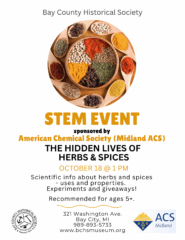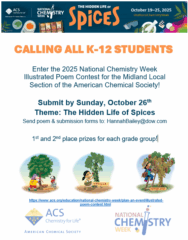H.H. Dow
By Robert Kohrman

The era of World War I brought many changes to Midland and The Dow Chemical Company. As the company increased its support for the war effort, employment went from 1,225 in 1916 to a wartime high of 3,000 in 1918. After the armistice, the workforce diminished from its previous levels to 500 persons but gradually rebounded again to 1,600 by 1926.
Through the same period, the population of the City of Midland increased from 4,455 in 1916 to approximately 9,000 in 1926. In 1918, H.H. Dow became president of the company and continued in his role as general manager of the firm. This year proved pivotal to the future of the company. The product line of the company included such successes as bromides, indigo, aspirin, salicylic acid, lime sulfur, lead arsenate, and carbon tetrachloride. Other products of this era included phenol, magnesium, ethylene, chlorine, and caustic.
According to R.S. Karpiuk’s work, Dow Research Pioneers, H.H. Dow persuaded the Board of Directors to pursue research, especially in the new area of organic chemistry, as an expanded priority of the company. This program “followed three specific lines: (i) research to improve and increase production of chemicals already being made; (ii) research aimed at creating new products or finding new uses for old ones; and (iii) crusading for protective tariffs to protect the infant chemical industry from German dumping and price cutting.”
Throughout the war years and the transition to peacetime, Dow hired a number of scientists who carried the burden of these new research agendas. One of these was W.J. Hale, son-in-law of H.H. Dow and faculty member at the University of Michigan. Hale presented a series of lectures on organic chemistry for five weeks during the summer of 1918 to Dow technical employees and was subsequently asked to join the company and begin an organic research laboratory.
The beginnings of new directions in research and the infusion of many new people created a climate where it was natural for scientists to desire a professional association which could promote scientific discourse. In addition, Hale came to Midland from Ann Arbor, a citadel of learning and, not coincidentally, the site of the oldest local section of the American Chemical Society in Michigan, founded there in 1899. In keeping with his background, Hale promoted the formation of the Midland Section of the ACS in late 1919. While W.J. Hale’s name was the first signature on the petition for the creation of the section, this act obviously also had the strong backing of H.H. Dow, who had joined the American Chemical Society as a member in 1898. Although Dow did not personally sign the petition document, the name of The Dow Chemical Company led the list; and on December 2, 1919, H.H. Dow was elected as the first chairman of the Midland Section of the American Chemical Society. He served in that capacity until June 1921, when E.O. Barstow succeeded him.
Despite being burdened by corporate responsibilities, Dow played an active part in many section activities. On May 8, 1922, he presented a program to the section entitled “Mechanical and Chemical Troubles and Methods of Overcoming Them During My Early Life in Midland.”
This program, like so much of the early efforts of the section, reflects the business of the company. It also shows Dow’s own drive and enthusiasm for competition and conservation, and his consuming desire to extract all possible improvements out of a process and product line.
H.H. Dow received many honors and awards including honorary doctorates from Case School of Applied Science in 1924 and the University of Michigan in 1930. He also received the prestigious Perkin Medal in 1930, given “in recognition of his achievements in the production of bromine, alkalies, magnesium and its salts and alloys, and phenols, and for other developments in industrial chemistry resulting from the activities of his company.”
Upon H.H. Dow’s death in 1930, the Midland section passed the following resolution:
“Whereas, we are indebted for the existence of our organization to the personal achievements and generosity of the late Dr. Herbert H. Dow, and
“Whereas, Dr. Dow was the first Chairman of this section of the American Chemical Society, and always its foremost member, honoring us by his world renown as a scientist, inventor, and outstanding leader in our industry and profession, and
“Whereas, Dr. Dow was a friend, untiring in his activities among us, and known and loved by all of us.
“Be it resolved, that in the passing of Dr. Dow from our membership, we have suffered a loss which calls forth our most profound sorrow, and which we shall ever continue to feel in the absence of our beloved friend and leader;
“Be it further resolved that we express our deepest sympathy to those nearest Dr. Dow whose loss is even greater than ours; and
“Be it further resolved that these resolutions be spread upon the minutes, as a record of our sentiment, and that a copy of these resolutions be sent to Dr. Dow’s family.”











